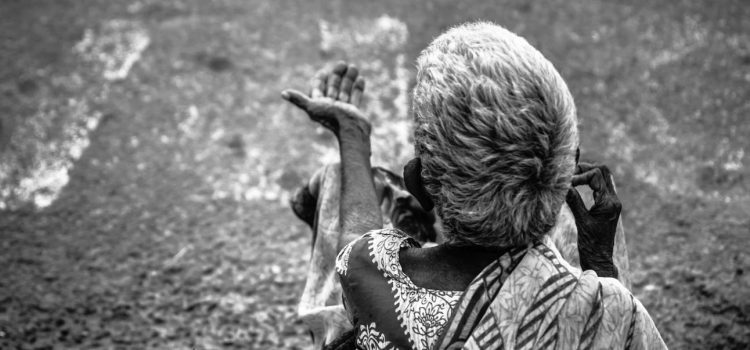

This article gives you a glimpse of what you can learn with Shortform. Shortform has the world’s best guides to 1000+ nonfiction books, plus other resources to help you accelerate your learning.
Want to learn faster and get smarter? Sign up for a free trial here .
Why does poverty exist? What geological and political factors increase people’s chances of living in poverty?
For many people, once they live in poverty, it’s hard to escape it. While others might blame them for their position in society, there are external factors that prevent people from becoming financially stable.
Let’s look at the five reasons why poverty exists, and why it’s not easy to solve.
1. Geography Landlocks a Nation
Geography is one of the top reasons why poverty exists. In Prisoners of Geography, Tim Marshall argues that much like the starting hand in a card game, the geography of a region determines how its economics develop. If it’s dealt a naturally winning hand, filled with natural resources and defensible natural boundaries, it will likely develop into a stable, successful state. On the other hand, if a nation’s hand includes poor-quality land, warring populations, and poorly drawn borders, it’s likely to experience difficulty and internal conflict.
For example, Marshall notes how northern European nations, such as France and Germany, have higher volume and quality of farmland as compared to their southern neighbors. As a result, Marshall claims, the northern nations have developed more robust economies, whereas southern European nations such as Italy and Greece have been more prone to recession and unemployment as their economies continue to develop.
In Paul Collier’s view, as pointed out in his book The Bottom Billion, geography makes a big difference in economic performance. Nations that are surrounded by other nations and lack access to waterways are at a significant economic disadvantage because trade routes are largely out of their control.
Landlocked countries are dependent on the economic policies of their neighbors, which Collier says can be positive or negative. Research suggests that if a landlocked country’s neighbors grow by an additional 1%, it grows by an additional 0.7%, due to spillover effects. For example, landlocked Switzerland has benefited from the growth of neighboring countries France and Germany, because higher incomes in these countries are often spent on Swiss imports.
In Africa, however, most countries are landlocked and suffer the negative spillover effects of their low-growth neighbors.
2. Exclusive Governments Prevent Upward Mobility
In Why Nations Fail, Daron Acemoglu and James A. Robinson explore nations that “fail,” or that are poor and unstable with low quality of life. Why does poverty exist, according to these authors? They say it’s because of political and economic institutions that are “exclusive” rather than open. These exclusive institutions enrich and empower a select group of elites at the expense of the population at large.
Under exclusive political institutions, those in power are free to create exclusive economic institutions that benefit themselves and their allies at the expense of everyone else. These exclusive economic institutions limit the economic activity of citizens by controlling what jobs they can have, what businesses they can run, and what technologies they can use or develop. This ensures that all market activity benefits those in power.
For example, Ellen lives in a nation with exclusive economic institutions and tries to start a business. To start her business, though, she has to bribe a government official, take out a high-interest loan from a state-run bank, and prove that she won’t sell anything “subversive.” These steps ensure that Ellen’s business benefits those in power first and foremost.
Why Exclusive Institutions Lead to Failure
Acemoglu and Robinson argue that exclusive institutions increase poverty for two main reasons:
1) Lack of technological development: Exclusive institutions prevent and discourage citizens from developing new technology, limiting access to the skills, resources, and opportunities necessary for citizens to develop new ideas. This is largely because exclusive leaders fear technological developments that could lead to major economic or social changes—changes that could destabilize their hold on power. The result is that an intelligent and creative citizen in an exclusive nation won’t have access to a technical education, won’t be able to choose their own career in science or technology, won’t have access to a lab or research team, and won’t be allowed to create or distribute any new ideas that might threaten the state.
2) No incentives for productivity: Citizens have no reason to work hard, create wealth, or start a business if their government can arbitrarily take everything they earn or imprison them.
3. People Get Stuck in the Cycle of Poverty
One of the reasons why poverty exists is because there’s a cyclical nature to it. In Maid, Stephanie Land has to contend with the cyclical way in which these factors interact with each other to exacerbate her poverty. Land and her daughter’s living conditions make Mia sick, which results in Land missing work. Complying with requirements for government aid also causes Land to miss work. And because Land and her daughter are barely surviving, any unforeseen expense or circumstance puts them at risk of homelessness.
1) Poverty causes illness and injury, which causes missed work. The apartment where Land and Mia live the longest contains mold, which causes respiratory problems and ear infections for Mia. In turn, taking Mia to the doctor causes Land to miss work. (Although Land’s job makes her sick, too, she works when she’s sick or injured to avoid losing income.)
In addition, Mia frequently contracts illnesses at her daycare. The daycare only calls Land to pick Mia up when Mia is very sick, but when that happens, Land has to miss work as well.
2) Complying with requirements for government aid causes missed work. Land often has to take time off work—and forfeit earned income—to attend appointments with her government caseworkers or comply with other requirements to continue receiving government aid
3) Unforeseen circumstances can result in homelessness. Land has to carefully track her income and expenses at all times to make sure she has enough to get through the month. She can’t buy anything without doing a mental calculation of how much money she has and which bills are about to come due. Any unforeseen expense, such as a small repair on her aging car, can send her spiraling into more severe poverty or homelessness. Her precarious life can’t tolerate minor unpredictability, much less major accidents.
4. Conflicts Enforce Economic Failure
Conflict in countries causes its citizens to be trapped in poverty. Specifically, The Bottom Billion focuses on civil wars and coups d’etat, which affect (or have recently affected) about 70% of the bottom billion, causing dramatic harm. Aside from the human costs, this violence reduces economic growth, scares off potential investors, and causes people (and their money) to flee. To Collier, reducing the prevalence of conflict is essential to elevating the bottom billion out of poverty.
Causes of Conflict
Collier and his researchers designed a model to uncover the causes of conflict in developing nations to examine why poverty exists. Among others, they measured variables like income, growth rates, income inequality, and ethnic composition to determine which factors increased the likelihood of conflict. In their analysis, they distinguished between civil wars and coups d’etat: For conflicts that lead to civil war, they discovered three main culprits: low income, slow growth, and natural resource dependence; for coups, Collier found that low income and stagnant growth are also the main predictors of government overthrow.
1. Low income: For a given nation, if current income is doubled, the risk of civil war is cut in half.
2. Slow growth, or economic decline: Each percentage point of GDP reduction increases civil war risk by a percentage point.
3. Natural resource dependence: The more a nation depends on revenue from natural resources, the greater the threat of civil war. Collier suggests that this is because rebels are more likely to take the risk of war to get their hands on the glut of natural resource money.
Collier’s findings contradict what many policymakers assume leads to civil war: income inequality, political repression, and a colonial legacy. Collier found these factors didn’t affect the likelihood of civil war one way or the other.
Ethnic diversity is another often-mentioned potential cause of conflict. But Collier found an increased risk of conflict only in societies with one ethnic group large enough to form a majority. This majority could oppress smaller groups through majority rule, leading to tension, eventual war, and worsening poverty.
5. Schools Are Failing Students in Poverty
Poor Economics by Abhijit V. Banerjee and Esther Duflo argues that schools in the developing world often don’t help the poor as well as they could. Teacher and student absenteeism is high and students are far behind in reading and math. Based on their research, the authors believe that the key reason schools fail so many poor students is that people have wrong expectations about who education is for and what it’s supposed to accomplish.
Poor parents expect education to result in a well-paying job for their children, write the authors. However, because there are few well-paying jobs in their areas, they tend to only educate the one or two children they feel are most likely to land such a job. Parents don’t bother educating the rest because they don’t see the value of teaching their kids basic literacy and numeracy skills unless it results in a coveted local job.
Unfortunately, this attitude means most children end up at a disadvantage in whatever jobs they eventually land, continue Duflo and Banerjee. Studies show that even farmers benefit from having basic education levels.
Further, the tendency to focus education only on an elite group of intelligent and talented children means that the kids who need education the most—those with fewer natural advantages—aren’t getting it, assert Duflo and Banerjee.
Therefore, no real progress can be made in improving education for the poor until the problem of wrong expectations is addressed. The children who grow up in poor conditions will continue to live in poverty in adulthood because their teachers neglect to give them the education they need for jobs.
Final Words
Because poverty is an endless cycle, it can feel impossible to get out of it once you’re in. Even if you do everything in your power to improve your financial situation, there are still external factors that explain why poverty exists. Slowly and surely though, systems are being put in place to help those who are struggling.
What are other reasons why poverty exists? Let us know in the comments below!

Want to fast-track your learning? With Shortform, you’ll gain insights you won't find anywhere else .
Here's what you’ll get when you sign up for Shortform :
- Complicated ideas explained in simple and concise ways
- Smart analysis that connects what you’re reading to other key concepts
- Writing with zero fluff because we know how important your time is






